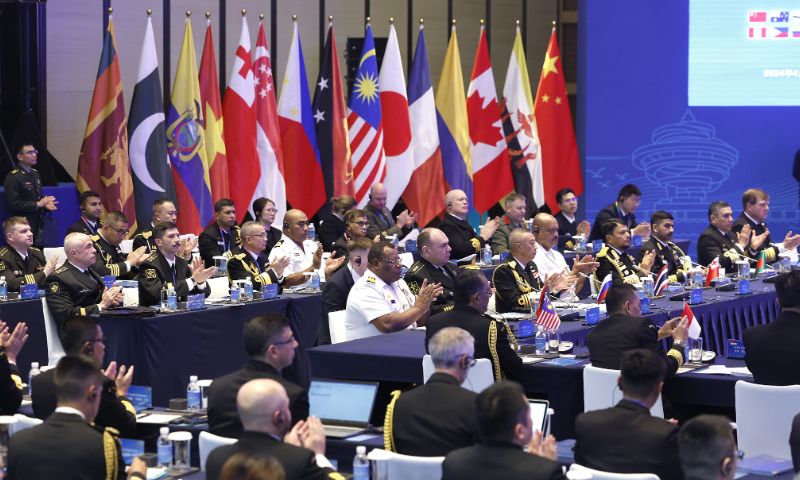
The 19th biennial meeting of the Western Pacific Naval Symposium (WPNS) is held in Qingdao, Shandong Province, from April 21 to 24. Photo: VCG
The 19th biennial meeting of the Western Pacific Naval Symposium (WPNS) was being held in Qingdao, Shandong Province, from Sunday to Wednesday. More than 180 foreign delegates from 29 countries, including major naval (maritime) defense leaders from 20 countries, attended. US Pacific Fleet commander Stephen Koehler and Russian navy chief Alexander Moiseev led their respective delegations. This year marks the 75th anniversary of the founding of the Chinese People's Liberation Army's (PLA) Navy. As a force of peace, civilization, and strength, the PLA Navy's global influence and appeal continue to grow. The high level of participation and representation of delegations at this year's meeting is a concrete manifestation of this influence.
The WPNS is a regional naval cooperation mechanism platform. After more than 30 years of development, it has become the regional naval multilateral cooperation mechanism that has produced the most achievements, the most vitality, and the greatest potential. China is one of the founding members of the mechanism, and this year, the PLA is hosting the WPNS again after a 10-year hiatus, with the theme "Seas of Shared Future" and three subtopics: the Global Security Initiative and maritime peace, maritime order based on maritime security cooperation and international laws, and global maritime governance. These three subtopics are a concrete manifestation of China's concept and practice of a shared destiny of the oceans. Through cooperation between the Chinese Navy and other countries, it aims to uphold maritime peace and security and address maritime threats and challenges.
Being one of the most important maritime areas in the world, the Western Pacific region consists of several crucial straits and waterways that play a significant role in global trade and maritime traffic. The region is rich in islands and marine resources, involving the interests of many countries. Especially in areas with maritime disputes, preventing accidental conflicts, achieving common development, and ensuring regional security and maritime safety are common concerns for countries in the region. Peace is a key word of this year's symposium and echoes the sentiments of most countries in the region. Particularly, in situations where some countries outside the region frequently engage in provocative military actions, maintaining regional peace and stability is not merely the responsibility of one or two nations but requires collective efforts from all countries in the region. The hosting of this year's symposium by China is with such profound considerations and responsibilities.
China has always been straightforward in its actions, committed to peace without merely relying on diplomatic rhetoric. According to the agenda, this symposium will discuss and vote on issues such as the WPNS Business Charter, the Code for Unplanned Encounters at Sea, Disaster Response Guide, and the unmanned system, aiming to provide guidance for reducing maritime military tensions in response to new changes. In order to ensure the success of the symposium, China has done a lot of preparatory work in advance. An observation from the symposium is that all member states expressed gratitude to the Chinese Navy for hosting the meeting in their speeches. Stephen Koehler, in his speech, also first expressed this gratitude towards China, while stating that the WPNS has provided an opportunity for naval leaders from various countries to communicate.
Foreign media have noticed that the Philippines did not send representatives to this symposium. In response, Chinese experts attending the meeting stated that as the host country of this year's meeting, China extended invitations to all member states and observer countries and was not aware of the specific reasons for the Philippines' absence. The Philippines' unexplained absence is indeed puzzling. However, the same day as the symposium convened, the US and the Philippines launched the largest-ever Balikatan or "Shoulder-to-Shoulder" joint military exercise. Philippine military personnel even claimed that "the purpose of armed forces, why we exist, is really to prepare for war," and "there is no sugarcoating it." These statements clearly imply something, but regional countries have no time to speculate, let alone indulge them. The tide of history is here, and one or two countries cannot shake the collective efforts of the region to maintain maritime peace and tranquility.
This symposium also serves as a platform to showcase the growth and confident image of the Chinese Navy to the outside world. A major nation must have a strong navy; this is a profound lesson drawn from modern Chinese history. Over the past 75 years, the PLA Navy has grown from nothing to become a fully-fledged strategic military branch with comprehensive capabilities, including nuclear and conventional arms. It is accelerating its progress towards the goal of becoming a world-class navy in all aspects. Regardless of whether certain countries are willing to acknowledge it, this trend is unstoppable.
Meanwhile, the powerful Chinese Navy serves as a guardian of world peace and important stabilizing force in the current regional situation. The presence of representatives from so many countries at this symposium, gathering to discuss topics dedicated to achieving peace, precisely demonstrates this point. We also hope that countries can make good use of this platform to promote mutual understanding and trust, transcend differences in safeguarding regional and global maritime peace and stability, and collectively compose a new chapter in maritime civilization.













